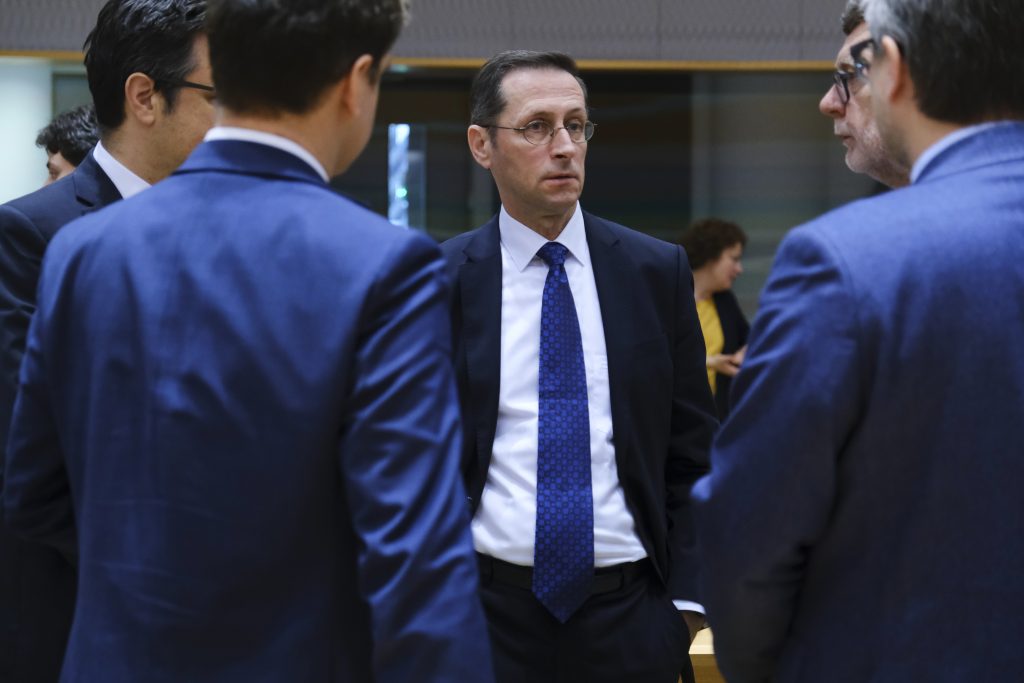EU finance ministers did not support the bloc’s plan to provide 18 billion euros in aid to Ukraine via joint borrowing, but approved an amendment to the financial regulation, allowing the “financing of the macro-financial assistance to take place within the so-called diversified funding strategy,” at their meeting in Brussels on Tuesday.
Media reports claimed that Hungary’s finance minister, Mihály Varga vetoed the EU’s joint borrowing, but according to the Hungarian ministry’s statement, there was no vote on the issue so Hungary did not veto anything. However, the Hungarian government had already made its opposition regarding the joint borrowing clear. Other issues on the agenda, such as the minimum corporate tax rate (which Hungary also opposes) were also postponed.

Finance Minister Mihály Varga at the Brussels meeting
Despite the fact that the Hungarian government has repeatedly made it clear that it opposes the joint borrowing out of principle – to prevent EU from becoming a debt union -, international media incorrectly connects the dots, claiming that Prime Minister Viktor Orbán uses this issue to secure the country’s EU funds.
Hungary has also been accused of vetoing financial assistance to Ukraine, but the government has already allocated Hungary’s share of the planned EU assistance from next year’s budget.
Viktor Orbán called the reports about the Hungarian veto “fake news”.
Hungary is ready to give financial assistance to Ukraine, on a bilateral basis. No veto, no blackmailing,
he tweeted. “We do want to convince EU member states however that common EU debt is not the solution. If we continue to go down the road towards a debt community, we will not be able to turn back,” the prime minister explained.
We envision a different future for Europe. One built on strong member states, instead of huge piles of common debt,
he added.
1/3 Today’s news was all about Hungary vetoing financial assistance to #Ukraine. This is fake news. Hungary is ready to give financial assistance to Ukraine, on a bilateral basis. No #veto, no blackmailing.
— Orbán Viktor (@PM_ViktorOrban) December 6, 2022
German Chancellor Olaf Scholz also addressed the issue at his press conference after the EU – Western Balkans summit in Tirana on Tuesday. When asked about his opinion of Hungary refusing to support the joint borrowing, the chancellor did not give a direct answer, but explained that he is “firmly convinced that it is necessary for the European Union to continue to support Ukraine with its possibilities”. He said he would like all 27 member states to support the proposal about the 18 billion euro aid and added that he was confident that they will succeed.
Photos via the European Council
!function(f,b,e,v,n,t,s)
{if(f.fbq)return;n=f.fbq=function(){n.callMethod?
n.callMethod.apply(n,arguments):n.queue.push(arguments)};
if(!f._fbq)f._fbq=n;n.push=n;n.loaded=!0;n.version=’2.0′;
n.queue=[];t=b.createElement(e);t.async=!0;
t.src=v;s=b.getElementsByTagName(e)[0];
s.parentNode.insertBefore(t,s)}(window,document,’script’,
‘https://connect.facebook.net/en_US/fbevents.js’);
fbq(‘init’, ‘228770251004422’);
fbq(‘track’, ‘PageView’);
(function(d, s, id) {
var js, fjs = d.getElementsByTagName(s)[0];
if (d.getElementById(id)) return;
js = d.createElement(s); js.id = id;
js.src=”https://connect.facebook.net/en_US/sdk.js#xfbml=1&version=v2.12″;
fjs.parentNode.insertBefore(js, fjs);
}(document, ‘script’, ‘facebook-jssdk’));


Leave a Reply